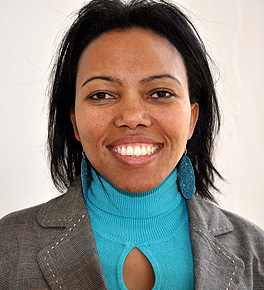OUR FELLOWS

OUR FELLOWS
The complex causes of poverty in Ethiopia demand complex solutions, says Meaza Melkamu Abawari, a horticulturalist who works with World Vision Ethiopia, a relief and development organization. In her work with smallholder farmers, Abawari stresses the importance of integrating improved agricultural methods with other disciplines, including natural resource management, demographic studies, gender issues, and cultural practices.
“The population rate is increasing, while agricultural production is decreasing. Where I work in Wallo district, farmers are raising as many as 18 children on half a hectare of land,” observes Abawari.
The population rate is increasing, while agricultural production is decreasing. Where I work in Wallo district, farmers are raising as many as 18 children on half a hectare of land,” observes Abawari. “New technologies are important, but they must go hand-in-hand with innovations in other sectors. We have to address farmers’ attitudes about the environment as a whole.
Field of Research
Gender-responsive capacity building in agriculture, natural resource management, and agriculture for
food security improvements and economic growth in Ethiopia.
